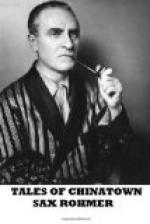On inquiring of the same waiter whom Harley had accosted whether my friend was there:
“I think a gentleman is upstairs with Mr. Meyer,” said the man.
“In his office?”
“Yes, sir.”
Thereupon I mounted the stairs and before a half-open door paused. Harley’s voice was audible within, and therefore I knocked and entered.
I discovered Harley standing by an American desk. Beside him in a revolving chair which, with the desk, constituted the principal furniture of a tiny office, sat a man in a dress-suit which had palpably not been made for him. He had a sullen and suspiciously Teutonic cast of countenance, and he was engaged in a voluble but hardly intelligible speech as I entered.
“Ha, Knox!” said Harley, glancing over his shoulder, “did you manage?”
“Yes,” I replied.
Harley nodded shortly and turned again to the man in the chair.
“I am sorry to give you so much trouble, Mr. Meyer,” he said, “but I should like my friend here to see the room above.”
At this moment my attention was attracted by a singular object which lay upon the desk amongst a litter of bills and accounts. This was a piece of rusty iron bar somewhat less than three feet in length, and which once had been painted green.
“You are looking at this tragic fragment, Knox,” said Harley, taking up the bar. “Of course”—he shrugged his shoulders—“it explains the whole unfortunate occurrence. You see there was a flaw in the metal at this end, here”—he indicated the spot—“and the other end had evidently worn loose in its socket.”
“But I don’t understand.”
“It will all be made clear at the inquest, no doubt. A most unfortunate thing for you, Mr. Meyer.”
“Most unfortunate,” declared the proprietor of the restaurant, extending his thick hands pathetically. “Most ruinous to my business.”
“We will go upstairs now,” said Harley. “You will kindly lead the way, Mr. Meyer, and the whole thing will be quite clear to you, Knox.”
As the proprietor walked out of the office and upstairs to the second floor Harley whispered in my ear:
“Where did she go?”
“No.------ Hamilton Place,” I replied in an undertone.
“Good God!” muttered my friend, and clutched my arm so tightly that I winced. “Good God! The master touch, Knox! This crime was the work of a genius—of a genius with slightly, very slightly, oblique eyes.”
Opening a door on the second landing, Mr. Meyer admitted us to a small supper-room. Its furniture consisted of a round dining table, several chairs, a couch, and very little else. I observed, however, that the furniture, carpet, and a few other appointments were of a character much more elegant than those of the public room below. A window which overlooked the street was open, so that the plush curtains which had been drawn aside moved slightly to and fro in the draught.




